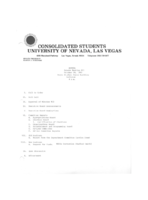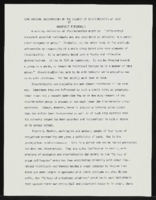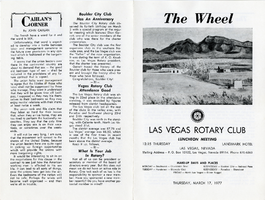Search the Special Collections and Archives Portal
Search Results

Meeting minutes for Consolidated Student Senate, University of Nevada, Las Vegas, October 28, 1980
Date
Archival Collection
Description
Text

"Some General Observations on the Subject of Discrimination at UNLV": article draft by Roosevelt Fitzgerald
Date
Archival Collection
Description
From the Roosevelt Fitzgerald Professional Papers (MS-01082) -- Drafts for the Las Vegas Sentinel Voice file. On UNLV.
Text

The Wheel Las Vegas Rotary Club newsletter, June 19, 1975
Date
Archival Collection
Description
Text

The Wheel Las Vegas Rotary Club newsletter, March 17, 1977
Date
Archival Collection
Description
Text

Alice Foley Yarish interview, August 31, 1993: transcript
Date
Description
An oral history interview conducted and edited by Robert D. McCracken; Esmeralda County History Project; Goldfield, 1993
Text

Transcript of interview with Edward "Ed" Butera by Stefani Evans and Claytee White, July 28, 2016
Date
Archival Collection
Description
Engineer Edward "Ed" Butera spent hours constructing models from the time he was a five-year-old boy in San Jose, California. Besides his interest in building and design, the young Butera also loved math and music—specifically the clarinet, at which he excelled, and which he still enjoys. After earning his Bachelor’s degree in Electrical Engineering at San Jose State University he was hired by Ralph Joeckel as a consulting engineer for Trane, a heating and air conditioning company. Joeckel became a mentor and "second dad" to Butera after the company sent him to Las Vegas in 1972, and the two remain close to this day. In this interview, Butera shares how he engineered and designed power, water, sanitation, utilities, and heating and cooling systems on many Clark County high schools, hospitals, and data centers while considering such factors as the building's shape and its affect on the way wind forces act on its glass, windows, and doors. He talks of his casino work that began with the Stardust soon after he arrived in Las Vegas, and before his client list grew to include Tony Marnell, Steve Wynn, and MGM. Besides the hotels, he shares his experiences engineering the infrastructure for the Bellagio fountains, The Mirage volcano, Treasure Island's pirate show.
Text

Louise Kirkwood interview, February 28, 1979: transcript
Date
Archival Collection
Description
On February 28th, 1979, collector Richard Probst interviewed Louise Kirkwood (born December 13th, 1925 in Kemmerer, Wyoming) at her residence in North Las Vegas, Nevada. In the interview, Mrs. Kirkwood discusses moving to Nevada and raising her family. She also discusses recreation in Nevada and her involvement in church activities.
Text

Transcript of interview with Jeanne P. Chretien by Cynthia L. Reeves, February 26, 1979
Date
Archival Collection
Description
On February 26, 1979, Cynthia L. Reeves interviewed Jeanne P. Chretien (born 1923 in Marshalltown, Iowa) about her life in Southern Nevada. Chretien first talks about her move to Las Vegas and her beginning education, including how the educational system has changed over time. She also describes her first occupations, political activity, involvement in groups such as the Girl Scouts, and early recreational activities. The two later discuss Block 16, entertainment, the atomic testing, the effects of World War II, and flooding in Las Vegas. The latter part of the interview includes topics on Chretien’s religious activity, her enrollment into Nevada Southern University, and the changes in Las Vegas over time. The interview concludes with Chretien’s thoughts on rearing children in Las Vegas as well as how she believes the city will continue to grow in the future.
Text

Transcript of interview with Alice Doolittle by Christopher Moran, March 21, 1977
Date
Archival Collection
Description
On March 21, 1977, Christopher Moran interviewed Alice Doolittle (born 1897 in Boston, Massachusetts) about her experiences while living in Nevada. Also present during the interview is Ruth Belding, Alice’s daughter. Doolittle first talks about her reasons for coming to Las Vegas and her eventual occupation as a dental assistant. She also talks about her family’s history of living on the Stewart Ranch and the ranch’s swimming pool that attracted many during the summers of Las Vegas. Doolittle also describes her move to Boulder City with her husband, the first theaters in Las Vegas, and the Union Pacific Railroad. At the end of the interview, the three discuss Helen Stewart, Harley Harmon, and the Doolittle Center, named after Doolittle’s late husband, Ferris Doolittle.
Text

Transcript of interview with Harry Kogan by Barbara Tabach, January 12, 2016
Date
Archival Collection
Description
With a liveliness of a man decades younger, Harry Kogan looks at his 100th birthday with cheer and satisfaction. Born March 11, 1916 to poor Russian immigrant parents in the Jewish ghetto of Philadelphia, Harry vividly recalls walking to school shoeless, with no hat or no raincoat. A treat would be his mother handing him ten-cents to go to the theater and enjoy a silent movie. After graduating from high school in 1933, Harry quickly took one of the rare jobs available in a garment manufacturing company where he worked his way into being a skilled and valued fabric cutter-a job that paid $35 a week. Harry was raised with two brothers and lived in Philadelphia for the first 91 years of his life before moving to Las Vegas. One of his brothers learned the refrigeration business while enlisted in the Navy and after the war formed a commercial refrigeration business named Kogan Brothers. Harry is a philosophical and philanthropic man. He was slow to retire and traveled the world, took classes and donated to his favorite causes; among which are the Boys Town Jerusalem and the Jewish Federation of Las Vegas. He sat for this interview to honor his Jewish roots, to share his life experiences and spending the past years in Las Vegas.
Text
